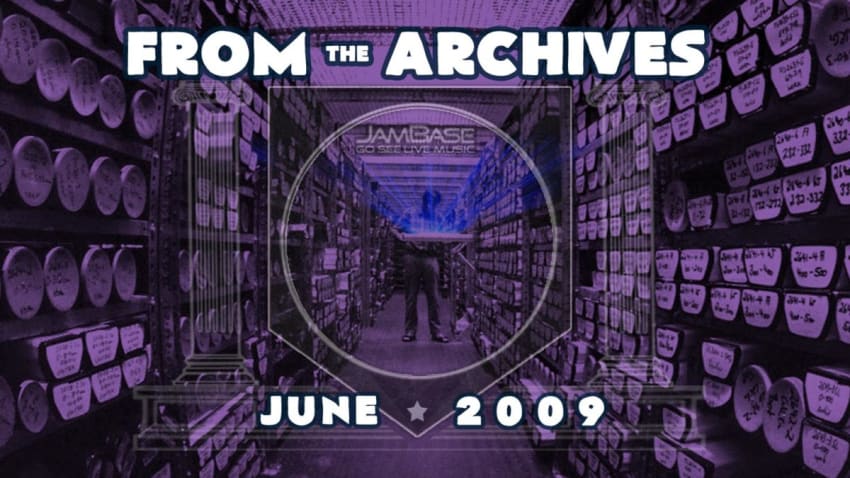Vieux Farka Touré: The Kid Is Alright
By Team JamBase Jun 2, 2009 • 8:30 pm PDT

 |
Embittered by his own early experiences with the music business, Ali had roundly opposed his son’s quest to become a professional musician, preferring that he enroll in the military. But after persistent lobbying from Ali’s longtime friend and collaborator, kora master Toumani Diabate, the patriarch had relented.
“But even though he supported me in my decision, he was always very divided,” Vieux says through his manager and translator, Deborah Cohen. “He bent to the fact that I was passionate about music and intended to be a musician no matter what he said. He was smart and went along with me. But he was never fully resigned to my choosing a musical path.”
So here was Vieux, standing before his ailing father, guitar in hand, ready to show one of Africa’s sonic superheroes the talent that he’d largely managed to keep secret from him. He dove in, knowing that his deft guitar work would surprise his father, who had mostly seen him play the calabash, the dried gourd drum that is a percussive staple of Malian music. As he finished his third song, Vieux looked over, hoping for a reaction. Ali Farka Touré was asleep. This was not exactly the ringing endorsement Vieux had sought.
“I can’t really say whether he loved it or not,” Vieux quips.
Such are the perils of life as the heir to a musical kingdom. Hell, the burden can be immense for anyone following in their father’s professional footsteps, musical or otherwise. Julian Lennon, Jakob Dylan, Femi and Seun Kuti and a host of Marley brothers, to name but a few, have all dealt with their familial inheritance with varying degrees of success.
 |
With the arrival last month of his sophomore effort, Fondo, the 28-year-old has made good on that promise. The album’s title, translated as “The Road,” is a nod to where Touré spent the better part of the past two years and where he gleaned a lifetime’s worth of lessons. There was the 2007 Richmond Folk Festival, Touré’s first foray into America’s massive outdoor music festivals, and the 2008 Montreal Jazz Festival, where he played on a double bill with Malian singer Salif Keita. And in 2008, Touré connected with funk legends Fred Wesley and Pee Wee Ellis for a series of tribute shows to the late James Brown.
“In Mali, we have a saying that traveling is the best school, and everywhere I’ve gone I’ve picked up something,” Touré says. “The album is representative of all of the things that I kept absorbing in my travels.”
As he did on his debut, Touré has collaborated with Diabate, who Ali had tapped as Vieux’s godfather when he realized that Vieux would not give up his pursuit of a musical career. Diabate guided Vieux’s development from the outset. The duo’s song on Fondo, “Paradise,” recalls In the Heart of the Moon, the brilliant album for which the kora king and Ali Farka Touré garnered a Grammy in 2005.
 |
Touré also continued to work with Afel Bocoum, his father’s longtime right-hand man. Bocoum appears on three tracks, including the traditional song “Wale.”
“Afel is my elder,” Touré says. “I’ve worked with him forever because I started with him. He followed me through this whole album almost 24 hours a day. He really gave me a huge amount of help and advice, and it’s always a privilege to work with him. He’s part of the family and I count on him for a lot.”
But while he maintains a fervent respect for the his country’s rich musical tradition, Touré grew up in an era when Tupac and Biggie were as ubiquitous on Bamako soundsystems as local legends like Keita, Diabate and his father. As a result, he draws on a wealth of Western influences on Fondo, an evolution of a sound that he calls “Koroboro Rock,” which sends traditional Malian rhythms through a filter of rock and reggae.
 |
Six Degrees Records, with which Touré had struck a deal to release Fondo, agreed. Fine co-produced Fondo and played electric bass on several tracks. His imprint is evident throughout, most unmistakably on “Diaraby Magni,” a dubby Afro-blues that sees Touré flicking sinewy notes over Fine’s funky bass, spreading his wings but bringing his homeland’s roots along for the ride.
Touré drew widespread attention over the past two years from fans and fellow artists alike, but 2009 is looking ripe for a leap into the stratosphere of the biggest names in African music. Touré has just begun a four-night stand at The Hideout in Chicago, where he’ll be joined by guest artists like Grouper and Zelienople. A week later he will be playing Bonnaroo. “My eyes nearly fell out of my head when I saw the lineup,” Vieux says, highlighting sets by David Byrne, Diabate and Béla Fleck, and Public Enemy. In addition, filmmaker Andrea Wozny continues work on To Timbucktu, a documentary of Touré’s rise, and he’s in talks with a number of American artists to work together.
Touré is a soft-spoken guy, and despite the acclaim that has been heaped upon him during his meteoric ascent he remains humble in the shadow of his father, with a bit of “I’ll show you!” moxie thrown in for good measure.
“I’m totally convinced that he would be very proud of me,” he says. “All I can say is that my father would probably expect the second album to be better than the first. And it is. So there!”
Vieux Farka Touré is on tour now, dates available here.
JamBase | Legacy Building
Go See Live Music!
